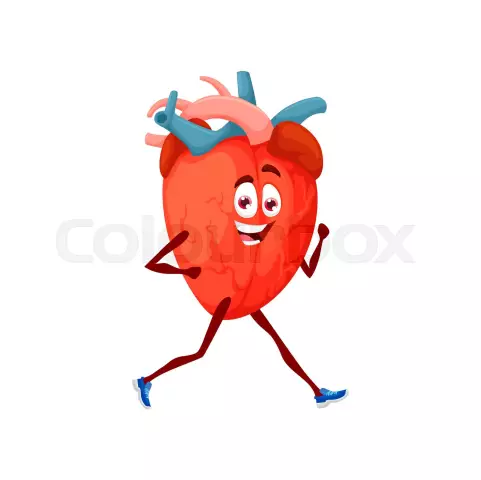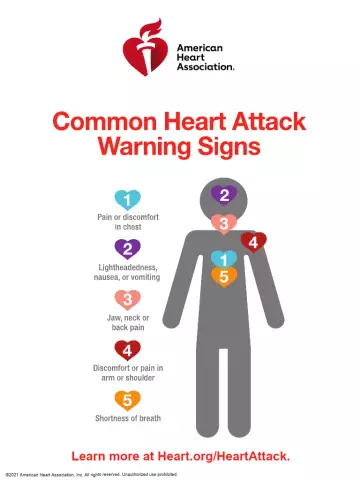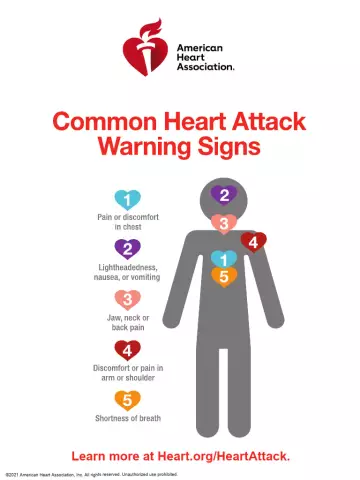- Author Rachel Wainwright wainwright@abchealthonline.com.
- Public 2023-12-15 07:39.
- Last modified 2025-11-02 20:14.
Jogging: from a heart attack or towards problems?
The expression "running from a heart attack" has long become the motto of people who maintain an active lifestyle. What's more, running is a hot trend, with treadmill sales in sporting goods stores being consistently high. But is it really possible and necessary for all people, without exception, to run in order to get their portion of health, vigor and good mood?

Source: depositphotos.com
Doctors warn: jogging "running away from a heart attack", you run the risk of meeting other diseases. Contrary to popular belief, not everyone should practice this sport.
First of all, you need to understand how jogging differs from other types of running. Its other name is jogging (from English jogging, shuffling running). The name itself contains the main difference between this type of running: the phase of the unsupported state (flight) is extremely small here. As soon as one leg pushes off the surface, the other drops to the ground. Other features of the technique are a hard blow with the heel on the support or "spanking" with a relaxed foot. The movement speed is 7-9 km / h, slightly more than the speed of fast walking.
The benefits of jogging
So, even beginners and people who are not in the best physical shape can do such a pace and running technique. Why is jogging useful and what can you achieve with it?
Running is really very beneficial for the human cardiovascular system, as it has a beneficial effect on small blood vessels. Physical inactivity leads to disruption of blood supply to tissues and atrophy of a large number of capillaries. Correct jogging maintains a given intensity of the heart's work and "opens" the collapsed capillaries, also promoting their germination into depleted areas of tissues.
Microcirculation of blood contributes to the work of the endocrine system: the production of hormones is improved and activated. In general, jogging speeds up the metabolism, which rejuvenates the body and increases its defenses. Lactic acid and carbon dioxide act as a stimulant, the content of which increases during jogging.
The normalization of blood pressure is another plus of jogging: when the pulse rate reaches 120-150 beats per minute, peripheral vessels expand and their resistance decreases.
The feeling of happiness and pleasure is noted by all jogging lovers. It occurs due to the increased production of endorphins. These hormones continue to work for an hour after a run. A morning run helps to eliminate excess hormones and calm nerves, and an evening run, on the contrary, recharges energy after a long day at work.
Finally, jogging can help you lose weight by burning more calories in the process. Therefore, it is recommended for most people trying to lose weight as a relatively light exercise.
What is the danger of jogging?
A number of physiologists who study the effects of jogging on the body identify the following absolute contraindications to jogging:
- congenital heart defects;
- suffered myocardial infarction or stroke;
- arterial hypertension above 180/110;
- diabetes;
- chronic kidney disease;
- sharp violations of the heart rhythm;
- ophthalmic problems that threaten retinal detachment.
As you can see, the list of contraindications is not so small. People with a history of similar diseases are advised to choose a type of physical activity that is not related to running.
The main danger when jogging is exceeding the permissible load on the heart. Unfortunately, many believe that the higher the load, the faster you can achieve the desired result. This is by no means the case. Judge for yourself: the maximum permissible heart rate when jogging is 180 beats per minute. What will happen to an untrained body and what will be the state of a person if his pulse suddenly rises from 60-70 beats to 180? Instead of gaining health, it is easy to lose it.
People who start jogging need to control their heart rate. Its limit values are calculated according to the following formula: 180 - age in years. A kind of control is given by nasal breathing - if during running it is possible to breathe only through the nose, then the pulse corresponds to 120-150 beats per minute.

Source: depositphotos.com
Joint problems are another unpleasant jogging effect. The way of running involves a long shock load on the knee joints, which can lead to injury and wear. If overweight people are engaged in jogging, then the load only increases. What matters more - a few pounds lost or severe knee pain? By the way, pain can also occur in the lumbar region due to its swinging. The most severe likely consequence is the displacement of the vertebral discs.
Finally, people who intend to gain expressive muscles with the help of jogging may not count on it: jogging, on the contrary, "dries up" the figure.
You need to run wisely
Not only wisely, but also with a stopwatch and a bottle of water. If the doctor has allowed jogging (and for any chronic diseases, you need to consult a doctor in advance), then you need to take this with responsibility. First of all, carefully study the correct running technique, preferably from video tutorials - so it is clearer.
With a lot of excess weight or poor physical shape, it is better to start with a brisk walk and only then, after 3-4 weeks, run a little. Pulse control should be regular: at the first stage, the pulse should not exceed 18-20 beats in 10 seconds. If it exceeded this value (120 beats per minute), you need to switch to walking. Jogging starts at 10 minutes, with enough jogging three times a week. Each week, the time can be increased by 10%. Do not allow dehydration of the body: water should always be at hand, otherwise you risk simply losing consciousness while running for health.
YouTube video related to the article:

Maria Kulkes Medical journalist About the author
Education: First Moscow State Medical University named after I. M. Sechenov, specialty "General Medicine".
Found a mistake in the text? Select it and press Ctrl + Enter.






